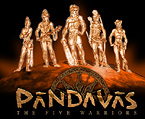



© 2001 VNN
|
WORLD Krishna - Computer Game Hero FROM WIRED NEWS  USA, Mar 9 (VNN) — by Swaroopa Iyengar USA, Mar 9 (VNN) — by Swaroopa Iyengar You are Hanuman, the Hindu monkey god. You need to jump over the Indian Ocean in one giant leap, fight Ravana the 10-headed demon king, find Queen Sita and set the entire Lankan Kingdom on fire with your tail. Then you have to bound back over the ocean to India to tell Lord Rama that his wife is safe. Or maybe you're the god Krishna, navigating the estranged Prince Arjuna's chariot through the battlefield of Kurukshetra in the famed Indian book of myths and legends Mahabharata. You must kill 100 enemy brothers using the limited magical weapons you possess. Failure means you have screwed up the fate of the world. You are playing a PC game based on Indian myths and legends and you're also borderline blaspheming sacred Hindu religious tales. Actually, the game by Purple Drop, a Santa Clara, California-company, is still in the development stage. But the company CEO hopes to get it to market soon, to take advantage of what he estimates to be a $50 to $200 million Indian games market. "The Indian gaming market is huge but unstructured," said Ashok Desai, CEO of Purple Drop. "The biggest markets today are outside India. But if we give Indians something they can relate to, something that is a part of their culture and heritage, I see a lot of potential there." But using religious themes in the games could also spark off negative sentiments within the country. Rajhamsa Das, vice president of the International Society for Krishna Consciousness (ISKON) in Berkeley, anticipates that the games will not become cause for concern among Indians in the United States but may cause controversy in India, where 80 percent of the population is Hindu. "When ISKON first started giving Brahmin initiations to Westerners, there were lots of people in India who protested and said they cannot be real Brahmins," Das said. "It depends upon how the games are presented. I think there will be some sort of stir but the games will not be banned." "But these concepts are not out of the question. I recently saw an advertisement for beer that had a picture of Ganesh -- the Indian elephant god -- on the can. Portraying ancient figures in a bad light has become a trend," he added. "The reason they don't have Jesus ... in any (American video) game is because of the idea that nobody should be able to kill Jesus -- even in a game," said Balaji Subramanian, who works in California. "With Indian legends, you're opening up a whole box of worms unless these characters aren't religiously inclined. But Desai hopes to make these games a "family affair" and wants to help people learn about Indian culture and be entertained at the same time. His company has recently received $4 million in funding from Pentamedia Graphics, a computer-animation company based in Chennai, India. Purple Drop has also acquired gaming rights on Pentamedia's animated feature film, Pandavas -- a story based on the Indian epic Mahabharata. Desai said they will initially release "archery war games," and then experiment with the thousands of other legends and folklore from India. "Local themes in India do have a certain following," Desai said. "For example, simple, basic games like, 'Throw mud-pies at Laloo Prasad Yadav (an Indian politician)' and 'The Kargil (India-Pakistan) War' are somewhat popular. Otherwise, games like Quake, Half-life and Zelda are imported and distributed within the country." The few gaming consoles available in India are too highly priced for the average Indian household -- and the PC is the dominant platform. "People will not buy PlayStation because they feel it to be a waste of money," Desai said. "But they will buy a computer -- they see it as a worthwhile investment." Still, companies that are taking tentative steps into the Indian markets deal with limited demographics. The average gamer is usually 12-18 years old and tends to stop indulging in computer games after college. "Gory, violent adult themes have a negative influence on the users. And it depends upon how these religious themes are presented," Desai said. "The complexity of the Mahabharata makes room for many games. We want to bring these Asian themes into the Western world." The games might fare even better in the West because of the novelty and challenge they present to potential players. "I grew up with these stories, and there is no particular god or demon I ever wanted to be, or kill," said Kunal Shah, 25, a computer engineer working in the Bay Area. "I would not want to play a game based on them. "And you would have to have really good graphics," he added. "For a game based on the Mahabharata to be appealing, you would have to draw armies and armies of people. Then the game should be easy to maneuver. Most stories have so many characters that including all of them would make the game too confusing. Making just war games even based on the legends does not hold much appeal -- there are so many already in the market." Desai said he could not predict how the West would interpret the philosophical and religious nuances of the games. "But as long as there is a good and evil element and the strategy is interesting, the games will work -- once the play is gripping the characters may even take backstage," he said. "There are super-heroes with super human strength in almost every game. And there are such characters readily available in Hindu mythology -- like Hanuman. He has all the elements that can create a cult following." Copyright © 1994-2001 Wired Digital Inc. All rights reserved.
|